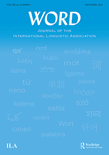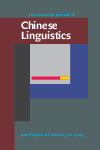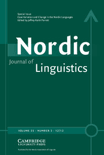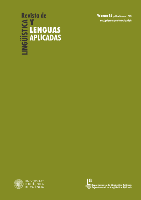
Linguistica Pragensia
Scope & Guideline
Illuminating Contemporary Linguistic Issues
Introduction
Aims and Scopes
- Linguistic Typology and Variation:
The journal examines the structural and functional aspects of different languages, focusing on typological comparisons and the variation found within and across linguistic systems. - Sociolinguistics and Language in Context:
Research often addresses the impact of social factors on language use, including the influence of urban settings, cultural interactions, and foreign language acquisition. - Historical Linguistics:
A significant area of focus includes historical developments in language, such as diachronic studies that trace changes over time in syntax, morphology, and semantics. - Language Teaching and Learning:
The journal frequently publishes studies on second language acquisition and pedagogical strategies, emphasizing the practical implications of linguistic research for educational contexts. - Word Formation and Lexical Studies:
Contributions often explore processes of word formation, including neologisms, anglicisms, and the dynamics of lexical borrowing across languages.
Trending and Emerging
- Multimodality and Language:
There is an increasing focus on how language interacts with other modalities, such as gesture and prosody, illustrating the complexity of communication beyond verbal expressions. - Language and Technology:
Emerging themes related to the impact of technology on language, including the adaptation of neologisms in response to digital communication, are becoming more prominent. - Interlanguage Studies:
Research on interlanguage phenomena, particularly how bilingual speakers navigate and negotiate their linguistic identities, is gaining traction, reflecting the realities of global language use. - Cultural Linguistics:
The exploration of how language reflects and shapes cultural identities is on the rise, emphasizing the interplay between language and socio-cultural contexts. - Pedagogical Innovations:
There is a growing interest in innovative teaching methodologies for second language acquisition, particularly in the context of online and hybrid learning environments.
Declining or Waning
- Traditional Grammar Studies:
There is a noticeable decline in papers focused solely on prescriptive grammar rules and traditional grammar frameworks, indicating a shift towards more descriptive and functional approaches. - Static Language Descriptions:
Research that solely describes language features without considering sociolinguistic or contextual factors is becoming less common, reflecting a trend towards more dynamic analyses. - Historical Textual Analysis:
While historical linguistics remains relevant, studies focused narrowly on the analysis of archaic texts without broader implications for contemporary language use are appearing less frequently.
Similar Journals

WORD-JOURNAL OF THE INTERNATIONAL LINGUISTIC ASSOCIATION
Advancing linguistic scholarship for a global audience.WORD-JOURNAL OF THE INTERNATIONAL LINGUISTIC ASSOCIATION is a leading peer-reviewed journal dedicated to advancing the field of linguistics and language studies. Published by Routledge Journals, Taylor & Francis Ltd, this esteemed journal has earned a reputation for its rigorous scholarship, reflected in its 2023 Q2 ranking in Linguistics and Language and its solid performance in Scopus Ranks. Encompassing a wide range of topics—from theoretical frameworks to empirical research—WORD serves as an essential resource for linguistics researchers, educators, and students alike. While currently not operating under an open access model, the journal is committed to providing high-quality, impactful research articles that contribute significantly to the linguistic community. With its convergence periods from 1998 to 2009 and 2015 to 2024, WORD continuously fosters the discourse of language studies, ensuring that critical insights and discussions are accessible for ongoing academic exploration.

International Journal of Chinese Linguistics
Transforming Understanding of Chinese Linguistic DynamicsInternational Journal of Chinese Linguistics is a distinguished publication that delves into various aspects of linguistic studies pertaining to the Chinese language. Published by John Benjamins Publishing Co, this journal stands out for its commitment to advancing the knowledge and understanding of Chinese linguistics within the global academic community. With an impact factor that places it in the Q2 quartile of linguistics and language, the journal is indexed in prominent databases, achieving ranks of #501 in Arts and Humanities and #580 in Social Sciences. These rankings reflect the journal's dedication to maintaining high scholarly standards and its relevance in both linguistic research and practical applications. While not categorized as Open Access, the journal provides necessary access through institutional subscriptions, thereby ensuring that valuable research reaches a broad audience. Covering a wide range of topics from syntax and phonetics to sociolinguistics and applied linguistics, the International Journal of Chinese Linguistics serves as an essential resource for researchers, professionals, and students seeking to deepen their understanding of the intricate relationship between language and culture in the Chinese context. With converging years from 2019 to 2024, it continues to evolve, reflecting ongoing developments in the field.

Voprosy Yazykoznaniya
Innovating Perspectives in Language and SocietyVoprosy Yazykoznaniya, published by the esteemed Russian Academy of Sciences and the State Academy of Humanities (GAUGN), stands as a leading journal in the field of linguistics and language studies. With an impressive Q2 rank in Linguistics and Language for 2023 and a strong position within Scopus rankings, this journal fosters scholarly dialogue and pushes the boundaries of linguistic research by providing a platform for innovative studies, reviews, and analyses. Although not open access, its publication ensures high academic standards and visibility within the global academic community. Researchers, professionals, and students alike can benefit from the rich insights and diverse perspectives presented in this journal, serving as a vital resource for anyone interested in the intricacies of language and its role in society. Operating since 2009 and continuing to 2024, Voprosy Yazykoznaniya is an essential reference point for contemporary linguistic scholarship in the Russian Federation and beyond.

Estudios de Linguistica-Universidad de Alicante-ELUA
Shaping the Future of Linguistics, One Study at a TimeEstudios de Linguistica-Universidad de Alicante-ELUA is a distinguished academic journal dedicated to advancing the field of linguistics, published by Universidad de Alicante. With an Open Access model adopted since 2020, ELUA facilitates greater accessibility to pioneering research for scholars and enthusiasts alike. The journal's ISSN is 0212-7636 and its E-ISSN is 2171-6692, ensuring it is indexed and easily discoverable in academic databases. Though the journal's H-Index is currently not specified, its commitment to disseminating high-quality linguistics research positions it as a valuable resource for researchers, professionals, and students. The journal aims to foster scholarly dialogue and innovation in various linguistic domains, making it an essential platform for sharing insights and findings that shape contemporary linguistic studies. Based in Alicante, Spain, ELUA is poised to contribute significantly to the global linguistics landscape.

Lingue e Linguaggio
Advancing Linguistic Knowledge Through Rigorous ResearchLingue e Linguaggio, published by SOC ED IL MULINO, is a distinguished academic journal in the field of Linguistics and Language, hailing from Bologna, Italy. With an esteemed Q2 ranking in its category as of 2023, this journal is recognized for its contributions to both the arts and humanities as well as social sciences, achieving notable positions within Scopus rankings. It serves as a vital platform for researchers, practitioners, and students interested in exploring various linguistic phenomena, language dynamics, and theoretical frameworks. Although it operates under a traditional subscription model rather than open access, its comprehensive array of studies and publications provides significant insights and fosters academic discourse. With a publication period extending from 2002 to 2024, Lingue e Linguaggio continues to be a key resource for advancing the understanding of language in contemporary contexts.

Nordic Journal of Linguistics
Unveiling the complexities of language through rigorous scholarship.Nordic Journal of Linguistics, published by Cambridge University Press, serves as a prominent platform for the dissemination of cutting-edge research in the field of linguistics. Established in 1978 and spanning over four decades, the journal has curated a rich repository of scholarly work that reflects the dynamic and evolving nature of language studies. With an impressive Q2 ranking in both the Linguistics and Language category and a commendable performance in Scopus rankings, placing it at the 74th percentile among Arts and Humanities, the journal is recognized for its high academic standards and impact on contemporary linguistic research. Scholars and practitioners can access a variety of studies that delve into different languages, linguistic theories, and methodologies, fostering broader understanding and dialogue within the linguistic community. Although the journal does not currently offer open-access options, it remains an invaluable resource for researchers, professionals, and students keen on advancing their knowledge of language and linguistics.

Revista de Linguistica y Lenguas Aplicadas
Connecting Scholars in the World of LinguisticsRevista de Linguistica y Lenguas Aplicadas, an esteemed journal published by UNIV POLITECNICA VALENCIA, EDITORIAL UPV, is a pivotal resource in the field of linguistics and applied languages. Since its inception, the journal has embraced Open Access publishing since 2006, ensuring that its rich repository of research is readily available to a global audience of researchers, academics, and language professionals. Headquartered in Valencia, Spain, the journal contributes significantly to the advancement of linguistics knowledge, boasting a respectable ranking within the Q3 quartile for Linguistics and Language (2023) according to Scopus metrics. It covers a diverse range of topics and methodologies, engaging readers through its commitment to scholarly rigor and innovation. The journal is uniquely positioned to inform and inspire essential discussions from 2015 to 2024, making it a vital platform for emerging linguists and seasoned scholars alike, as they explore the evolving landscapes of language and communication.

Glossa-A Journal of General Linguistics
Unlocking the Secrets of Language and TheoryGlossa: A Journal of General Linguistics, published by the Open Library of Humanities, stands as a leading voice in the realm of linguistic research since its inception in 2016. With its Q1 category ranking in Linguistics and Language and impressive Scopus ranks encompassing the top 83rd and 81st percentiles in its respective fields, Glossa fosters a vibrant academic community committed to the rigorous exploration of language and linguistic theory. Operating under an open access model, the journal not only enhances the visibility of groundbreaking research but also ensures that valuable insights are accessible to a global audience. The journal's commitment to interdisciplinary dialogue makes it an indispensable resource for scholars, professionals, and students eager to engage with contemporary developments in linguistics. As it converges into 2024, Glossa continues to champion innovative scholarship and critical discourse that challenges conventional boundaries within the field.

Chuzhdoezikovo Obuchenie-Foreign Language Teaching
Championing Inclusive Practices in Language TeachingIntroducing Chuzhdoezikovo Obuchenie - Foreign Language Teaching, a prominent journal published by NATSIONALNO IZDATELSTVO AZ BUKI, dedicated to the field of foreign language education. With its ISSN 0205-1834 and E-ISSN 1314-8508, this journal aims to provide a comprehensive platform for researchers, educators, and practitioners to share insightful studies, innovative methodologies, and transformative practices in language teaching. The journal is based in Sofia, Bulgaria and is strategically positioned to contribute to the discourse on language acquisition and pedagogy, targeting a global audience interested in enhancing foreign language competencies. Although specific impact factors and H-index data may be unavailable, the journal's commitment to quality and relevance in the field is evident through its rigorous peer-review process, ensuring that published works meet high academic standards. Emphasizing accessibility and inclusivity, Chuzhdoezikovo Obuchenie invites submissions that reflect contemporary challenges and advancements in language education, making it an essential resource for anyone invested in the future of multilingual instruction.

NEUPHILOLOGISCHE MITTEILUNGEN
Illuminating Contemporary Discussions in LanguageNEUPHILOLOGISCHE MITTEILUNGEN, published by the esteemed Modern Language Society, stands as a significant contribution to the domain of Language and Linguistics. With a history dating back to 1971, this journal has consistently provided an academic platform for researchers and scholars, navigating through the intricacies of philology and linguistic studies. Although it is indexed in Scopus with rankings reflecting its position in the Arts and Humanities and Social Sciences categories, it currently does not offer Open Access, which may require interested parties to seek institutional access for its wealth of content. The journal has experienced periods of coverage discontinuation in recent years, yet it remains a valued source for advancing the understanding of language theories and linguistic practices. Its location in Helsinki, Finland, offers a unique European perspective on global linguistic issues. The journal is ideal for those looking to engage with evolving linguistic trends and contribute to contemporary discussions in the field.